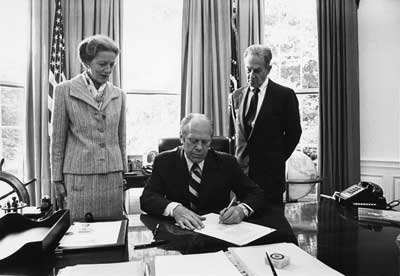Communication between elected officials has often been a topic of conversation among the American public. Leaders are expected to interact with a certain degree of decorum. Utilize the debate on the Senate floor regarding The Vietnam Disengagement Act, which occurred on April 15, 1971 as an example of debate over fundamental issues. What evidence of polite disagreement can you identify in this document?
Link to Document
- Debate over the Vietnam Disengagement Act from the Congressional Record, April 15, 1971. View now or open the PDF version (2.9MB)

Clifford Case and Millicent Fenwick meet with Gerald Ford
While we have no record of any communication shared between Clifford Case and Richard Nixon or officials within his administration, other members of Congress did advise the president on the best course of action as he dealt with the ramifications of Watergate. Many of these legislators, even those within the president's party, suggested that Nixon spare himself and the nation the pain and drama of impeachment proceedings by leaving office as gracefully as possible.
Using the knowledge you have gained about Case's philosophy toward Watergate, your task is to draft a memorandum from Clifford Case to Richard Nixon expressing your thoughts on his role in Watergate and your suggestions for his future course of action. Your memo should meet the following requirements:
- It should be approximately 250-350 words in length
- It should be written in the style of Clifford Case. Remember that this memo is from one individual in a position of power to another with arguably even greater power. The tone should be frank, yet polite and measured.
- It should include clear references to the opinions expressed by Case's constituents: the citizens of New Jersey.
- It should clearly articulate your beliefs.
- It should make reference to the constitutional principles underlying your beliefs.
- The teacher should introduce the concept of personal communication and the techniques associated with successfully conveying ones thoughts to another.
- The teacher should direct the students to the Electronic New Jersey activity entitled "Legislative Checks the Executive." If the students do not have access to the Electronic New Jersey site, the text and activity are as follows:
Communication between elected officials has often been a topic of conversation among the American public. Leaders are expected to interact with a certain degree of decorum. Utilize the debate on the Senate floor regarding The Vietnam Disengagement Act, which occurred on April 15, 1971 as an example of debate over fundamental issues. What evidence of polite disagreement can you identify in this document?
Link to Document
- Debate over the Vietnam Disengagement Act from the Congressional Record, April 15, 1971
While we have no record of any communication shared between Clifford Case and Richard Nixon or officials within his administration, other members of Congress did advise the president on the best course of action as he dealt with the ramifications of Watergate. Many of these legislators, even those within the president's party, suggested that Nixon spare himself and the nation the pain and drama of impeachment proceedings by leaving office as gracefully as possible.Using the knowledge you have gained about Case's philosophy toward Watergate, your task is to draft a memorandum from Clifford Case to Richard Nixon expressing your thoughts on his role in Watergate and your suggestions for his future course of action. Your memo should meet the following requirements:- It should be approximately 250-350 words in length
- It should be written in the style of Clifford Case. Remember that this memo is from one individual in a position of power to another with arguably even greater power. The tone should be frank, yet polite and measured.
- It should include clear references to the opinions expressed by Case's constituents, the citizens of New Jersey.
- It should clearly articulate your beliefs.
- It should make reference to the constitutional principles underlying your beliefs.
- The students should first examine the debate that occurred on the Senate floor and engage in small group or whole class discussions about the models or polite debate that are apparent in the document. The teacher can generate a list of features that should be incorporated into their memo.
- Students may work on this assignment individually or in small groups.
- The teacher may wish to encourage peer editing to reinforce writing skills.
- Ideas can be shared among the students in the class.
- Another alternative for this lesson could involve having the students script a private conversation between Clifford Case and President Nixon, which would then be performed for the class.
- Students can read the article entitled "The Post-Watergate Presidency" from the Fall 1974 issue of the Columbia Journal of Law and Social Problems. This article contains an analysis of the ways in which the presidency was changing after Watergate as well as remarks from Clifford Case. The students should use this to evaluate the presidents following Nixon, writing a position paper determining whether or not these presidents fit into the mold of the imperial presidency or diverted from the patterns of the past.
- The students can prepare materials designed to advise a modern day president from Clifford Case's standpoint. Examples include:
- Ronald Reagan and the Iran-Contra Scandal
- Ronald Reagan and the invasion of Grenada
- George W. Bush and the invasion of Iraq
- Barack Obama and the troop surge in Afghanistan